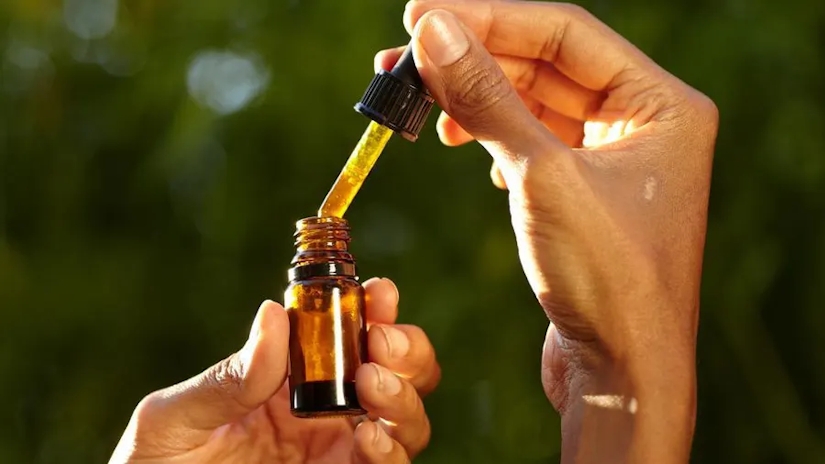
PHOTO BY Getty Creative
CBD Tincture Vs. CBD Oil: Differences & Uses
CBD Tincture vs CBD Oil: Understanding the differences.
In recent years, the surge in popularity of Cannabidiol (CBD) has reshaped the landscape of health and wellness.
Following the federal legalization of hemp-derived products in 2018, a significant portion of the U.S. population has explored the benefits of CBD, leading to an array of products flooding the market. Among these, CBD oils and tinctures have become particularly prominent, often mentioned in the same breath but representing distinct entities. This introduction aims to shed light on the essential differences and similarities between CBD oils and tinctures, guiding consumers through their choices to find the best fit for their health and wellness goals.
CBD, a non-psychoactive compound found in cannabis plants, has garnered acclaim for its potential health benefits without the intoxicating effects associated with THC (tetrahydrocannabinol). Its versatility is evident in the wide range of products available, from topicals and edibles to the focus of our discussion: oils and tinctures. These products are celebrated for their potential to alleviate pain, reduce anxiety, enhance sleep quality, and promote a sense of overall well-being.
CBD oil, a blend of CBD extract with a carrier oil like coconut (MCT) oil or hemp seed oil, offers a versatile method of consumption. It can be used sublingually, ingested, or applied topically, catering to a variety of user preferences. The carrier oil not only facilitates easier absorption but also enhances the product’s shelf life and palatability. CBD oil’s broad application spectrum and mild taste make it a favored choice for those seeking the therapeutic benefits of CBD in a flexible and user-friendly format.
Contrary to common perception, CBD tinctures are distinct from oils, primarily due to their alcohol-based extraction process. Utilizing high-proof alcohol as a solvent, tinctures extract the beneficial compounds from hemp, resulting in a potent and fast-acting liquid.
The alcohol content not only preserves the extract but also enhances the bioavailability of CBD, allowing for rapid absorption, especially when taken sublingually. This method bypasses the digestive system for quicker onset, making tinctures an attractive option for those in need of swift relief.
While both CBD oils and tinctures offer similar therapeutic benefits, their differences lie in composition, taste, and method of consumption. Oils provide a milder flavor and the option for topical application, appealing to a broader audience.
Tinctures, with their alcohol base, might offer quicker absorption but can come with a stronger taste that not all users appreciate. The choice between the two boils down to personal preferences, with considerations for taste, desired effects, and lifestyle needs playing pivotal roles.
Deciding between CBD oil and a tincture is a matter of aligning the product with individual health goals, preferences, and consumption methods. Both stand as effective avenues for exploring the benefits of CBD, yet understanding their nuances enables consumers to make informed decisions tailored to their unique needs. As the CBD landscape continues to evolve, so does our understanding of how best to harness its potential for health and wellness.
CBD Tincture Vs. CBD Oil

PHOTO BY Catherine Falls Commercial / Getty Images
While both CBD tinctures and oils serve as popular vehicles for the consumption of Cannabidiol, understanding their fundamental differences is crucial for users to make an informed choice that aligns with their preferences and lifestyle needs. At the core, the primary distinction lies in their method of preparation and base ingredients, which subsequently influences their application, efficacy, and user experience.
CBD tinctures are alcohol-based extracts, where high-proof alcohol is used both as a solvent to extract the beneficial compounds from the cannabis plant and as a base for the final product. This method of extraction is traditional and ensures a potent product that benefits from the preservative qualities of alcohol, extending its shelf life.
Pros Of CBD Tincture
Ease of Incorporation: CBD tinctures seamlessly blend with foods and drinks, making them an excellent choice for those who prefer not to take their CBD sublingually or have sensitivities to the taste of hemp.
Precise Dosing: The dropper bottles commonly used for tinctures allow for accurate measurement, facilitating consistent and controlled dosing.
Cons of CBD Tincture
Perceived Potency: Some users believe tinctures to be less potent than oils due to the dilution factor of alcohol, which might affect the perceived effectiveness.
Taste Factor: The bitter taste of alcohol can be off-putting for some, making it less palatable unless diluted in another beverage or food item.
In contrast, CBD oil is created by infusing a carrier oil, such as coconut (MCT) or hemp seed oil, with CBD extract. The oil serves not only as a solvent but also helps to improve the absorption of CBD into the body, making it a popular choice for those seeking the benefits of CBD in a more concentrated form.
Pros of CBD Oil
Flavorful Varieties: CBD oils are often available in a range of flavors, catering to the taste preferences of a diverse user base and mitigating the natural earthiness of hemp.
Versatility in Application: Beyond oral consumption, CBD oils can be applied topically, offering targeted relief for skin issues and localized pain.
Cons of CBD Oil
Cost Considerations: The production process of CBD oil, especially when involving high-quality hemp extracts and carrier oils, can render it more expensive than other CBD products.
Taste Intensity: Unflavored variants can have a potent hemp taste, which might not be appealing to all users. Even flavored oils might not completely mask the intrinsic flavor, posing a challenge for those sensitive to taste.
When weighing the pros and cons of CBD tinctures versus oils, it’s essential to consider factors such as the preferred method of consumption, sensitivity to tastes, budget constraints, and specific health objectives.
Both forms offer distinct advantages and challenges, catering to the diverse needs and preferences of the CBD community. Whether seeking the quick integration of a tincture into daily meals and drinks or the potent, versatile application of CBD oil, users are empowered to select the option that best complements their wellness journey.
How To Use CBD Tincture & CBD Oil
CBD tinctures stand out for their versatility and ease of use, making them a popular choice among CBD enthusiasts. These alcohol-based extracts can be seamlessly incorporated into daily routines, offering a straightforward approach to dosage and consumption.
For those looking to enjoy the benefits of CBD without altering their diet or habits significantly, adding a few drops of CBD tincture to meals or beverages is an excellent method. The tincture blends well with both hot and cold drinks, ensuring that its presence is discreet yet effective.
Alternatively, for a more direct and faster-acting effect, placing the tincture under the tongue allows for quick absorption into the bloodstream. It’s important to note, however, that CBD tinctures are specifically designed for oral consumption and will not provide the desired effects if applied topically. Their formulation aims to maximize internal absorption, rendering them ineffective for skin application.
CBD oil, on the other hand, provides a slightly different approach to CBD consumption. With its carrier oil base, it’s designed to be taken sublingually or ingested directly.
Dropping CBD oil under the tongue and holding it there for a few moments before swallowing maximizes absorption through the mucous membranes, offering an efficient pathway into the bloodstream.
This method facilitates a relatively quick onset of effects. If the taste is a concern or for those seeking a more gradual release of CBD’s benefits throughout the day, incorporating CBD oil into food or drinks is an alternative strategy. It’s noteworthy that when ingested, CBD oil typically requires 1 to 2 hours to take effect as it passes through the digestive system.
This delayed onset can be beneficial for users looking for sustained effects over time, although it requires planning and patience to align with individual schedules and needs.
Whether used sublingually or as an ingredient in meals, CBD oil’s versatility and array of consumption methods cater to a broad spectrum of preferences and objectives.
Herb Recommended Products:
READ MORE










